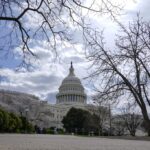The US government is reportedly preparing to announce significant changes to its handling of marijuana, a psychoactive drug that is legal in dozens of states but classified as one of the most dangerous substances under federal law. Evidence suggests that the Biden administration is working on moving marijuana from schedule I to schedule III of the Controlled Substance Act (CSA), a move that could have wide-ranging implications.
Changing the classification of marijuana to schedule III would reduce the tax burden on businesses operating in states where it is legal and potentially impact how law enforcement agencies enforce marijuana laws. However, some advocates for marijuana legalization argue that this change would not resolve conflicts between state and federal laws that have arisen since the legalization of marijuana gained momentum.
Currently, marijuana is subject to the same federal restrictions as drugs like heroin and ecstasy under the CSA. However, 38 states have approved its use for medical purposes, and 24 states and the District of Columbia allow recreational consumption. This conflict has created challenges for the marijuana industry, particularly regarding access to banking services.
Rescheduling marijuana to schedule III would not address these challenges, according to Paul Armentano, deputy director of the National Organization for the Reform of Marijuana Laws (Norml). He argues that marijuana should be descheduled entirely to align with the majority of states that have chosen to regulate it as a legal commodity.
A recent Gallup survey found that a record 70% of Americans believe marijuana use should be legal. However, President Biden’s stance on marijuana reform appears more cautious. While he pardoned individuals convicted of simple marijuana possession and initiated a review of its classification under the CSA, he has not expressed support for full legalization.
The US Department of Health and Human Services (HHS) recently completed its review of marijuana’s classification and recommended that it be placed on schedule III, alongside drugs like ketamine and anabolic steroids. This recommendation was made in an unusual public status update by HHS Secretary Xavier Becerra.
Rescheduling marijuana could benefit businesses by reducing their tax burden, particularly for minority-owned businesses. However, opponents of marijuana legalization, such as Kevin Sabet, president of Smart Approaches to Marijuana, argue that lowering its CSA schedule would harm public health by increasing commercialization and glamorization of the drug.
While rescheduling marijuana would be a significant step, the conflicts between state and federal laws would still need to be resolved by Congress. Progress in this area has been slow, with a bill known as the Safer Banking Act currently making its way through the Senate to allow cannabis businesses access to more financial services.
The potential rescheduling of marijuana represents a significant development in the ongoing debate surrounding its legal status in the United States.











